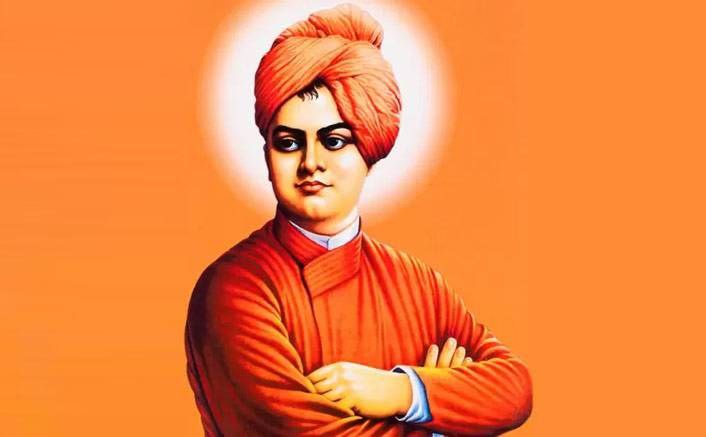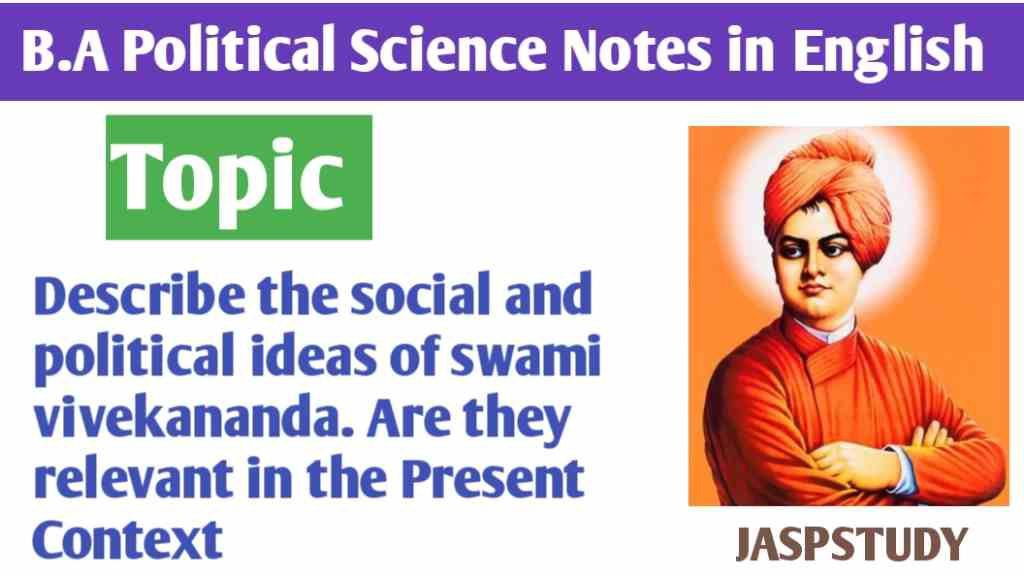In this Article we will Social and Political ideas of Swami Vivekananda. First of all we will see about social ideas of swami vivekananda and further we will also see about political ideas of swami vivekananda.
Social and Political ideas of Swami Vivekananda
Swami Vivekananda, one of the most influential spiritual leaders of India, had powerful social ideas that aimed to improve society and encourage people to live with dignity, equality, and service. His thoughts focused on the importance of spiritual growth, social equality, women’s empowerment, education, and social justice.

Social Ideas of Swami Vivekananda
Here is a look at some Social Ideas of Swami Vivekananda.
1.Spirituality and Social Responsibility
Vivekananda believed that spirituality is not just about personal growth or meditation. He argued that true spirituality should lead a person to serve society and improve the lives of others. He taught that helping the poor, the sick, and the oppressed is a form of spiritual practice. For Vivekananda, being truly spiritual meant working to make the world a better place. This idea is important even today, as many people still face poverty, hunger, and discrimination. His belief in the connection between spirituality and social service continues to inspire many.
2.Equality for All
Swami Vivekananda was a strong believer in equality for all people, regardless of their caste, religion, or background. He strongly opposed the caste system and untouchability, which treated certain groups as less important or inferior. Vivekananda taught that every human being has the same divine potential and should be treated with respect and dignity.
His message was clear: a society cannot progress if it discriminates against certain groups. He believed that for India to become a strong nation, it needed to embrace social equality and remove the barriers that divided people. This idea is still very relevant today in the fight against caste-based discrimination, racism, and social injustice.
3.Empowering Women
Vivekananda had a deep respect for women and believed that their empowerment was crucial for the progress of society. He often spoke about the importance of women’s education and independence. According to him, a nation’s true strength is reflected in the way it treats its women. He said that the progress of women leads to the progress of the entire nation.
He supported women’s rights to education, freedom, and equality. He criticized the social practices that restricted women, such as child marriage and the lack of opportunities for women to receive education. Vivekananda’s views on women’s empowerment continue to inspire movements for gender equality and women’s rights around the world.
- Difference between Constitution and Constitutionalism
- Traditional Methods of Comparative Study
- General Characteristics of Traditional Comparative Politics
- Main features of constitutionalism
- Growth of the Executive Powers in Modern Time
- Discuss the Main features of Present World Order
- Main features of Realist Approach in the study of International Relations
4.The Importance of Education
Vivekananda believed that education was one of the most powerful tools for social change. He argued that for a nation to progress, its people needed to be well-educated. But he didn’t just mean academic knowledge; he believed education should focus on building character, values, and practical skills that would help individuals contribute positively to society.
He emphasized the need for education for everyone, especially women and the poor, as they were often excluded from formal education. Vivekananda’s idea was that education should help people become self-reliant and responsible citizens. His thoughts on education are still relevant today as access to quality education remains a key issue in many parts of the world.
5.Service to Humanity
Vivekananda’s central message was that every individual should serve humanity. He often said that serving others was the highest form of worship. He encouraged people to work for the welfare of others, especially the poor, the sick, and the marginalized. He believed that working for the well-being of others brings true happiness and fulfillment.
In today’s context, Vivekananda’s call to serve humanity is important. In a world where many people face hunger, disease, and poverty, his message encourages individuals and organizations to engage in acts of kindness, charity, and social service.
6.Social Justice and Reform
Vivekananda was deeply concerned about the social problems in India, such as poverty, illiteracy, and caste discrimination. He believed that social reforms were necessary for the progress of society. He encouraged people to challenge outdated social practices that held back social progress, such as untouchability and child marriage. He wanted to create a society where every individual could live with dignity and equal opportunities.
His thoughts on social justice are still important today as many societies continue to struggle with issues of inequality, injustice, and social exclusion.
7.Conclusion
Swami Vivekananda’s social ideas were revolutionary for his time and continue to be relevant today. His teachings on spirituality, equality, women’s empowerment, education, service, and social justice inspire people to work for a better society. He encouraged individuals to rise above their personal limitations and serve humanity. His vision of a united, equal, and progressive society remains a guiding light for social reforms and positive change in the modern world.
- Presidential System of Government: Meaning, Features, Merits, Demerits
- Role of SAARC Notes | Achievements of SAARC
- Decline of Legislature in present time
Political Ideas of Swami Vivekananda
Swami Vivekananda’s political ideas were deeply connected to his views on society, culture, and spirituality. He believed that true political progress came from both inner spiritual strength and external social reforms. Here is a look at his main political ideas.
1.Nationalism and Unity
Vivekananda had a unique view of nationalism. He believed that India needed to be united to become strong and independent. For him, nationalism was not just about political freedom, but about the spiritual and cultural revival of India. He called for people to rise above their differences of caste, religion, and region and work together as one nation. His idea of nationalism focused on unity, pride, and self-reliance.
2.Self-Reliance and Independence
Vivekananda strongly believed that India could only progress if its people became self-reliant. He encouraged people to stop depending on foreign powers and to rely on their own resources, skills, and abilities. He believed that political freedom would come when the people of India developed a sense of inner strength and self-confidence. This message of self-reliance was important not only for personal growth but also for the nation’s political and economic progress.
3.Spiritual Politics
Vivekananda believed that politics should be connected to spirituality. He thought that the true purpose of politics was to uplift people and work for the common good. For him, a politician should not only be focused on gaining power but also on serving the people and promoting their welfare. He saw politics as a means to bring about social change and equality, not just for political gain.
4.Rejection of Western Ideals
Vivekananda was critical of Western ideas of materialism and individualism. He believed that India needed to reject the idea of blind imitation of the West. He felt that India should maintain its cultural and spiritual identity while adapting modern knowledge for its growth. For Vivekananda, the political future of India depended on reviving its spiritual and cultural heritage, which he felt had been weakened under British rule.
5.Democracy and Social Justice
Though Vivekananda was not directly involved in politics, he strongly supported the idea of democracy and social justice. He believed in equal rights for all people, including women, the poor, and the marginalized. He wanted a society where everyone, regardless of their social background, had the opportunity to improve their lives. He believed that the political system should focus on uplifting the weakest sections of society.
6.Conclusion
Swami Vivekananda’s political ideas were centered on the concepts of unity, self-reliance, and social justice. He wanted India to become a strong, self-sufficient nation, grounded in its cultural and spiritual heritage. His thoughts on democracy and the role of politics in social upliftment continue to inspire political thinkers and leaders today.
Relevance of Social and Political Ideas of Swami Vivekananda
Swami Vivekananda’s social and political ideas remain highly relevant today. His belief in unity across differences of caste, religion, and region is a powerful reminder in a world that is often divided. Vivekananda encouraged people to come together as one nation, working for the common good. In today’s world, his idea of unity can help heal divisions in societies facing conflict.
Vivekananda’s idea of self-reliance is also important today. He believed that individuals and nations should not depend on others for their success. This message encourages people to develop their skills and resources, fostering independence and strength.
His call for equality and social justice is crucial in today’s fight against discrimination based on caste, gender, and race. He spoke out against untouchability and advocated for the empowerment of women, an idea that is still vital in the ongoing struggle for women’s rights and gender equality.
Vivekananda also emphasized the importance of education for all, believing it is the key to social change and progress. His thoughts on spiritual politics and service to humanity continue to inspire leaders and individuals who want to create a better and more just society.

